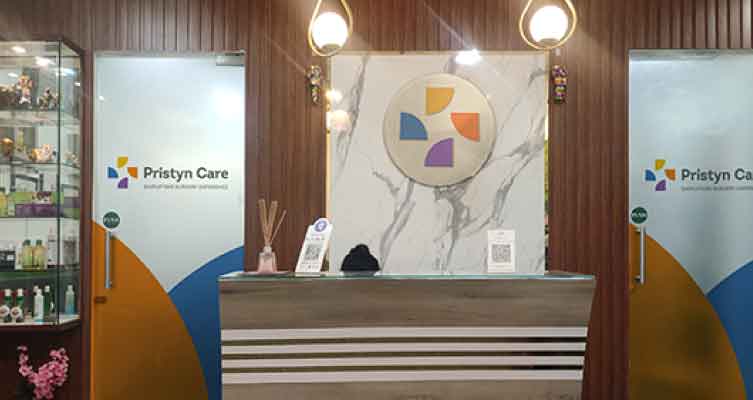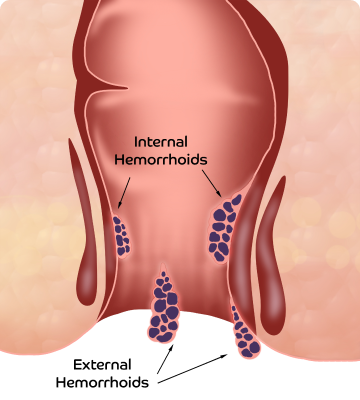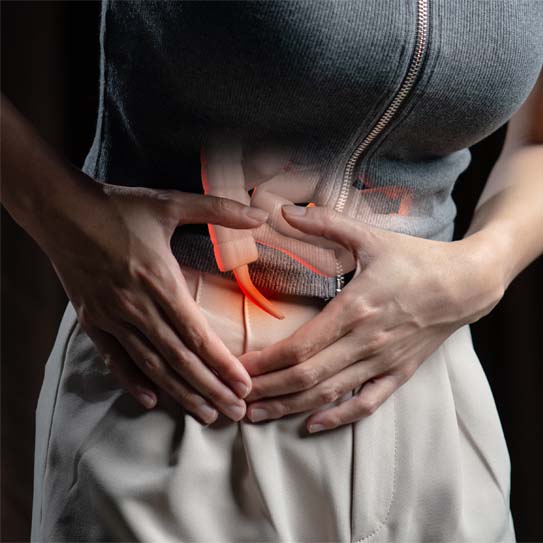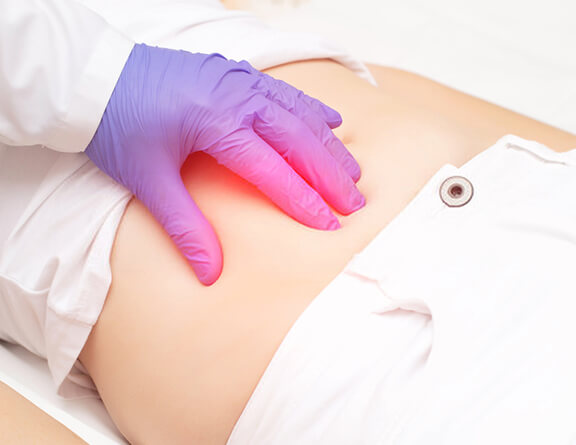Pristyn Care offers simplified laparoscopic surgery for appendicitis in Nashik
Pristyn Care is a full-stack health care provider that is associated with a few of the best doctors and surgeons in Nashik to achieve excellent surgical results concerning appendicitis removal or any other treatments. We are also associated with some of the best hospitals in the city with state-of-the-art facilities so that all our patients get high-class treatment. We endeavor to provide a seamless surgical experience to every patient via the best specialists in the city.
Benefits of undergoing appendicitis surgery in Nashik from Pristyn Care are:
- Minimal cuts and incisions
- A very high success rate
- Instant relief from the pain
- Daycare surgery
- you can go home on the same day of surgery
- Done under general or local anesthesia
- Faster recovery
- Minimal to minimal blood loss loss
- Insurance approval assistance
- No upfront payment
- COVID safe clinics and hospitals
- Zero EMI facility
What are the post-surgery preventive measures after appendectomy (appendix removal)?
Post-surgery preventive measures are essential for a surgery to be successful. A surgeon can only perform surgery to treat the condition but it is up to the patient to look after his or her health after the surgery.
Following pointers will help your body heal after appendectomy surgery –
- Avoid strenuous activity during the first few weeks. If your appendectomy is done via laparoscopic surgery, limit your physical activities for about one week. In case of an open appendectomy, you should limit any major physical activity up to four or five weeks after the surgery. Consult your surgeon regarding the limitations on your activities and when you can resume your daily routine after surgery.
- Provide support to your abdomen when you cough, laugh or move to help reduce any pain. You can place a pillow over your abdomen and apply pressure for the same.
- Consult your doctor if you don’t feel any relief from the pain. Being in pain puts extra stress on your body and slows the healing process.
- Increase your physical activity as you feel up to it. Begin with gradual movements and short walks without excessive strain around the abdomen.
- Take rest when tired and try to get good sleep. As your body heals, you may feel sleepier than usual.
You can consult your doctor before returning to work or school. Children may be able to return to school less than a week after surgery, but if you’re an adult, you should consult the doctor. However, patients after appendectomy should wait for two to four weeks to resume strenuous activity, such as gym classes or sports.
How can I book an appointment for appendicitis treatment with Pristyn Care in Nashik?
You can book an appointment with Pristyn Care by any of the following methods:
- Fill out and submit the patient form on our website www.pristyncare.com. Our team will reach out to you for further assistance. You can then discuss the appointment details with them, and they will confirm the appointment according to your preferences.
- Connect with our medical coordinators via the contact number on our website. The medical coordinator will listen to your problems and get back to you at the earliest and connect you to the right doctor.
- You can also book an appointment through the Pristyn Care app. Our medical coordinators can also arrange an online consultation from doctors via video call, and a nominal consultation fee will be charged.
What is the difference between acute and chronic appendicitis?
Most people confuse chronic and acute appendicitis with each other. Appendicitis occurs when the appendix becomes infected or inflamed and starts causing abdominal pain. But in acute and chronic cases, the frequency and severity of the pain are quite different.
Acute Appendicitis
Appendicitis is said to be acute when a person develops severe symptoms suddenly within 24-48 hours. It is a medical emergency that should be treated without further ado. It occurs due to the following reasons-
- A viral, bacterial, or parasitic infection in the digestive tract
- Stools causing a blockage in the tube between the large intestine and appendix
- Inflammatory bowel disease
- Injury or trauma in the abdomen
- Tumors
Without treatment, the appendix can rupture or burst out within 2-3 days if the symptoms persist. Moreover, the abdominal pain will be intense and hard to ignore.
Chronic Appendicitis
Chronic appendicitis can occur due to many different reasons, such as:
- Inflammation and obstruction of the appendix
- Accumulation of fecal matter
- Calcified fecal deposits or appendix stones
- Trauma to the abdomen
- Enlarged lymph nodes and glands
- Build up of foreign objects
- Tumor
In chronic cases, the pain (this is the primary symptom) of appendicitis lasts for longer periods, most often a week or so. There can be other symptoms like fever, swelling, tenderness in the abdomen, tiredness, nausea, diarrhea, etc. present alongside. However, not all people with chronic appendicitis will have these symptoms.
The symptoms also subside on their own and return abruptly, which further makes it harder for the doctor to diagnose the condition accurately. Out of all the cases of appendicitis, only 1.5% are chronic.
What complications can arise if appendicitis is left untreated?
Appendicitis can become life-threatening if it is not treated on time. There is a very high possibility that acute appendicitis causes the appendix to rupture, due to which the fecal matter and bacteria spill into the abdominal cavity. This can lead to the following complications:
- Peritonitis– As the appendix bursts, the lining of the abdominal cavity or peritoneum can become infected and inflamed. This is called peritonitis which is a fatal condition. If this happens, you will have a fast heartbeat, high fever, shortness of breath, and severe abdominal pain consistently. The doctor will first have to treat the infection with the help of antibiotics. Once the infection is resolved, only then can the doctor proceed with appendix surgery.
- Abscesses– Sometimes, abscesses may also form around the burst appendix. It usually forms when the white blood cells in the body try to fight the infection. To treat appendicitis, the doctor will first treat the infection and drain the abscess to perform an appendectomy.
- Sepsis– In rare cases, the bacteria from the ruptured appendix may enter the bloodstream and travel to other parts of the body, causing sepsis. It will cause symptoms such as high or low temperature, confusion, severe sleepiness, and shortness of breath. It is one of the main reasons for death in appendicitis patients.
If these complications arise, it can make it difficult for the doctor to treat appendicitis right away.
How is laparoscopic appendectomy better than open appendectomy?
Open appendectomy is the traditional approach that is performed through an incision of about 5cm or 2 inches on the right side of the lower abdominal wall. Laparoscopic appendectomy is a modern procedure that is performed through multiple small-sized incisions, each of about 1 cm or 1/2 inch.
While open appendix surgery is highly invasive, laparoscopic appendix surgery is minimally invasive and has the following advantages over the traditional approach.
- Tiny scars with less tissue cutting
- Reduced post-surgical pain
- Reduced risk of wound infection
- Shorter hospital stay
- Quicker return to normal activities
- Higher success rate
- Minimal restrictions on diet
- Faster recovery
Open and laparoscopic appendectomy has several risks and complications. But it is up to the surgeon to choose the best technique for the patient. In most cases, a patient prefers to undergo laparoscopic appendix removal surgery. However, in some cases, especially when the appendix is infected, the doctor may have to use the open surgical technique to carry out the procedure safely.
Post-Surgery Care After Appendectomy
Whether you’ve had open appendicitis surgery or laparoscopic surgery, you will have to follow the doctor’s instructions to take care of the wound and overall health. You will have to follow the tips below:
- Take a bland diet in the next few days after having an appendectomy. Advance gradually and start eating your usual food only if your body allows it.
- You may experience constipation for a few days after surgery due to heavy pain medications. Most patients don’t have bowel movements up to 3 days after surgery. Therefore, the doctor may prescribe stool softeners or laxatives to help prevent constipation.
- Pain is natural after a surgical procedure. Therefore, the doctor will prescribe some pain medications as well as anti-inflammatory and antibiotic medicines.
- Usually, dissolvable sutures are used to close the wound. However, in some cases, stitches may be used. In both scenarios, keep the wound clean and dry. Make sure that you don’t soak in hot tubs or swim as it can cause irritation or infection in the wound.
- You can take a bath the day after the surgery, but don’t let the incisions get wet.
- Avoid driving until the doctor gives you permission.
- Limit your physical activities and make sure that you don’t lift heavy weights for at least two weeks after surgery.
- Wear loose and comfortable clothes that give you freedom of movement and don’t rub against the wound.
- Visit the doctor for post-surgery follow-ups whenever required or as suggested by the doctor.
How to prevent appendicitis?
Generally, there is no assured way to prevent appendicitis from occurring except for diet control. By choosing the right food and a balanced diet, you will be able to keep your digestive tract healthy and prevent the appendix from becoming inflamed.
Foods You Should Eat:
All foods that are rich in fiber help to prevent appendicitis. These foods include:
- Oats or wheat gram for breakfast
- Whole wheat flour
- Brown rice
- Fresh fruits
Foods You Should Avoid:
Here are the food items that can increase your risk of appendicitis:
- Fried foods are fatty and irritate the digestive system.
- Alcohol as it harms the liver and affects digestion.
- Processed foods, such as meat or frozen food items.
- Baked goods, including cakes, pastries, cookies, etc.
- Excess of sugar











.svg)









